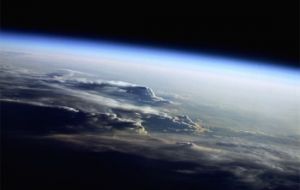MercoPress. South Atlantic News Agency
Global warning: New gases worry scientists
 New dangers for the ozone layer
New dangers for the ozone layer Carbon dioxide is not the only greenhouse gas that worries climate scientists. Airborne levels of two other potent gases _ one from ancient plants, the other from flat-panel screen technology _ are on the rise, too. And that has scientists wondering about accelerated global warming.
The gases are "methane and nitrogen trifluoride". Both pale in comparison to the global warming effects of carbon dioxide, produced by the burning of coal, oil and other fossil fuels. In the past couple of years, however, these other two gases have been on the rise, according to two new studies. The increase is not accounted for in predictions for future global warming and comes as a nasty surprise to climate watchers. Methane is by far the bigger worry. It is considered the No. 2 greenhouse gas based on the amount of warming it causes and the amount in the atmosphere. The total effect of methane on global warming is about one-third that of man-made carbon dioxide. Methane comes from landfills, natural gas, coal mining, animal waste and decaying plants. But it is the decaying plants that worry scientists most. That is because thousands of years ago billions of tons of methane were created by decaying Arctic plants. It lies frozen in permafrost wetlands and trapped in the ocean floor. As the Arctic warms, the worry is that this methane will be freed and worsen warming. Scientists have been trying to figure out how they would know if this process is starting. It still is early, and the data are far from conclusive, but scientists say they fear that what they are seeing could be the start of the release of the Arctic methane. After almost eight years of stability, atmospheric methane levels, measured every 40 minutes by monitors near remote coastal cliffs, suddenly started rising in 2006. The amount of methane in the air has jumped by nearly 28 million tons (25.4 million metric tons) from June 2006 to October 2007. There is now more than 5.6 billion tons (5.1 billion metric tons) of methane in the air. "If it's sustained, it's bad news," said Ron Prinn, an atmospheric scientist at the Massachusetts Institute of MIT atmospheric scientist Ron Prinn, lead author of the methane study. "This is a heads up. We're seeing smoke. It remains to be seen whether this is the fire we're really worried about. "Whenever methane increases, you are accelerating climate change." The study will be published in the journal Geophysical Research Letters Oct. 31.




Top Comments
Disclaimer & comment rulesCommenting for this story is now closed.
If you have a Facebook account, become a fan and comment on our Facebook Page!